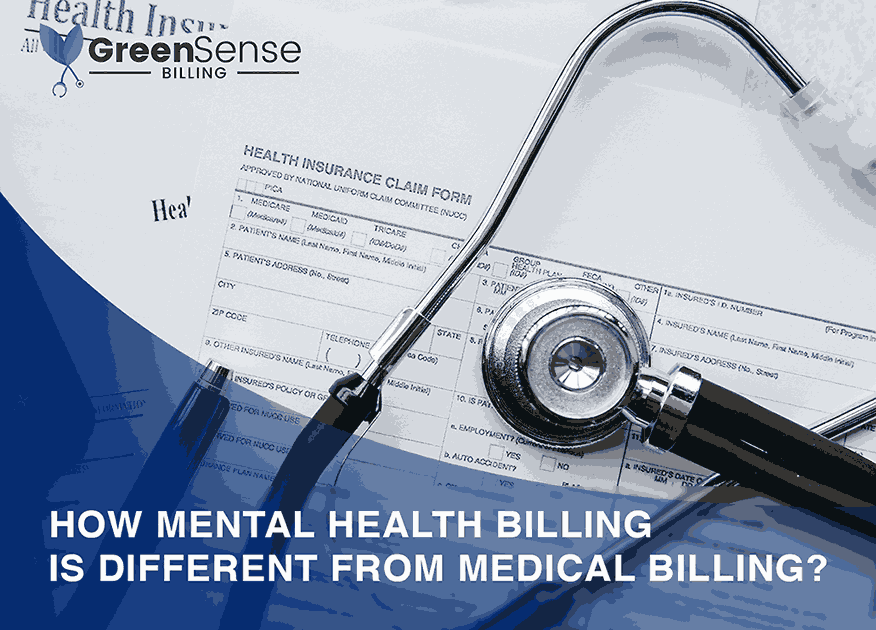In a glimpse
Yes, mental health billing is different mainly due to the specific service codes used, insurance coverage limitations, and the privacy concerns unique to mental health services.
Mental health billing and medical billing are both crucial components of the healthcare system, facilitating the process of healthcare providers getting paid for their services.
However, despite their shared goal, there are significant differences between the two, reflecting the distinct nature of services, regulatory environments, and challenges faced within each domain.
This article will explore these differences in detail, providing insights into how billing practices in mental health and medical fields adapt to their unique requirements and challenges.
Introduction to Billing in Healthcare
Billing in healthcare is a complex process that involves submitting and following up on claims with health insurance companies to receive payment for services rendered.
This process can vary significantly depending on the nature of the services provided, the type of healthcare provider, the insurance policies in place, and regulatory requirements.
While medical billing covers a broad spectrum of healthcare services, mental health billing specifically deals with services provided in the field of psychiatry and psychology.
Fundamental Differences
1. Service Codes and Classification
One of the primary differences between mental health billing and medical billing lies in the service codes used to classify and bill for services.
Medical billing utilizes the Current Procedural Terminology (CPT) codes, which cover a wide range of services, from surgical procedures to diagnostic tests. In contrast, mental health billing also uses CPT codes but relies heavily on a more limited subset of these codes that specifically relate to psychiatric and psychological evaluations, therapy sessions, and other mental health services.
Additionally, mental health billing often requires the use of diagnosis codes from the Diagnostic and Statistical Manual of Mental Disorders (DSM) or the International Classification of Diseases (ICD) to specify the mental health condition being treated.
This adds an extra layer of specificity necessary for billing but also requires mental health professionals to be adept at accurately diagnosing and coding mental health conditions.
2. Insurance Coverage and Limitations
Insurance coverage and limitations can differ markedly between mental health and other medical services.
Historically, mental health services were less likely to be covered, or covered to a lesser extent, by insurance policies. Although legislation such as the Mental Health Parity and Addiction Equity Act in the United States has aimed to address these disparities, challenges remain.
Mental health providers often have to navigate more stringent limitations on the number of sessions covered, pre-authorization requirements, and higher co-pays or deductibles for patients, complicating the billing process.
3. Billing Procedures and Follow-up
The billing procedures and the level of follow-up required can also vary.
Mental health billing might involve more intensive follow-up efforts due to the higher likelihood of claims being denied or partially paid by insurance companies. The reasons for denials can include issues like lack of pre-authorization, exceeding coverage limits, or coding errors. As a result, mental health providers or their billing staff must be diligent in tracking claims, appealing denials, and ensuring accurate documentation to support the necessity of services provided.
4. Privacy and Confidentiality Concerns
Privacy and confidentiality are paramount in mental health services, given the sensitive nature of the information shared by patients. This has implications for billing, as mental health providers must navigate the requirements of the Health Insurance Portability and Accountability Act (HIPAA) and other regulations carefully to protect patient information. This might limit the amount of information that can be shared with insurance companies, requiring providers to balance the need for sufficient detail to secure payment with the need to maintain patient confidentiality.
Challenges Unique to Mental Health Billing
Mental health billing faces unique challenges, including:
Navigating Varied Coverage Plans: Mental health practitioners often deal with a wide variety of insurance plans, each with its own set of rules and coverage limitations for mental health services.
Pre-Authorization Requirements: Obtaining pre-authorization for mental health services can be a cumbersome process, requiring detailed documentation of the patient’s condition and proposed treatment plan.
Stigma and Misunderstanding: Stigma surrounding mental health can sometimes extend into the insurance realm, with claims adjusters or policies reflecting outdated views on mental health treatment.
Conclusion
As mental health providers, the journey through the intricacies of billing for mental health patients can be challenging. The unique requirements for service classification, navigating insurance coverages, adhering to strict privacy regulations, and the often-complex claim follow-up processes demand not only your time but also a deep understanding of both mental health and billing practices. It’s a multifaceted task that can detract from your primary mission: to provide exceptional care to those in need. If you find yourself overwhelmed or in need of support, remember that GreenSense Billing is here to help streamline this aspect of your practice.
Our professional healthcare billing service can provide you peace of mind and allow you to dedicate your energy where it’s needed most – on the mental well-being of your patients.
FAQs
What distinguishes mental health billing from medical billing?
Uses specific codes, faces more insurance limitations, and prioritizes privacy.
Do insurance companies cover mental health services differently?
Yes, often with stricter limitations and higher patient costs.
Are pre-authorizations more common in mental health billing?
Yes, especially for long-term or intensive mental health treatments.
How does HIPAA affect mental health billing?
It mandates stringent confidentiality and information protection measures.
Can GreenSense Billing handle both psychiatric and therapy billing?
Yes, they specialize in comprehensive mental health billing services.
Does Greensense Billing offer support for dealing with insurance denials?
Yes, they assist in appealing and managing insurance claim denials.



















